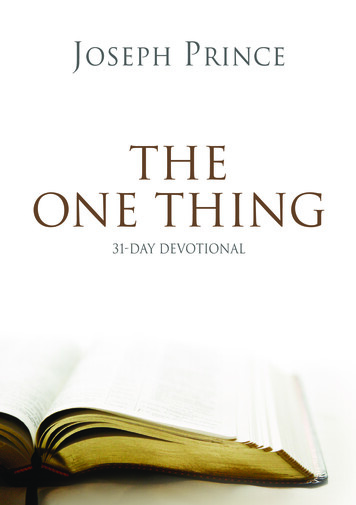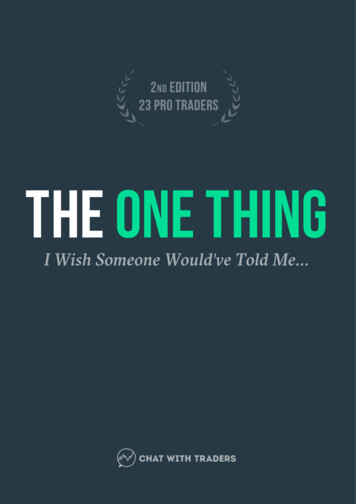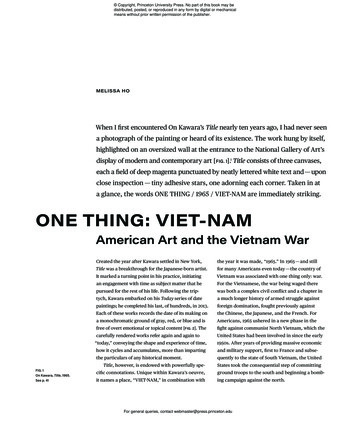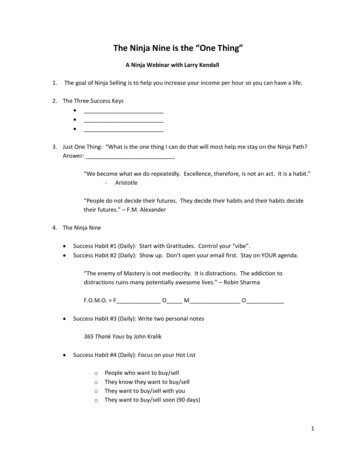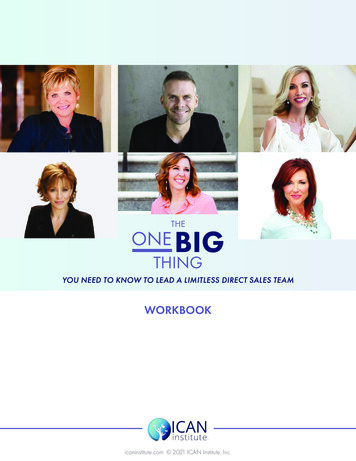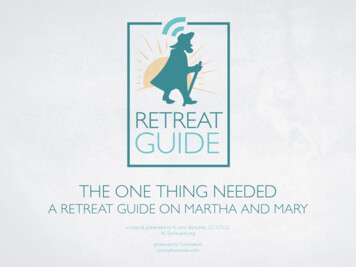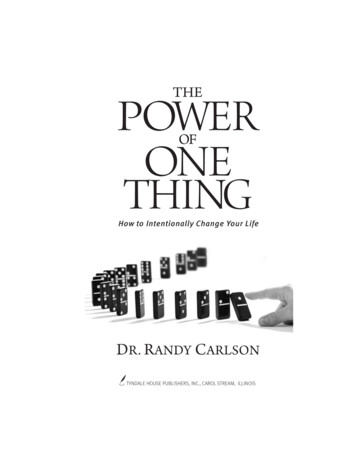
Transcription
POWERONETHINGTHEOFHow to Intentionally Change Your LifeDR. RANDY CARLSONTYNDALE HOUSE PUBLISHERS, INC., CAROL STREAM, ILLINOISPower.indd v7/17/2009 4:40:32 PM
Visit Tyndale’s exciting Web site at www.tyndale.com.TYNDALE and Tyndale’s quill logo are registered trademarks of Tyndale House Publishers, Inc.The Power of One Thing: How to Intentionally Change Your LifeCopyright 2009 by Dr. Randy Carlson. All rights reserved.Cover photo taken by Stephen Vosloo and Dan Farrell, copyright by Tyndale House Publishers,Inc. All rights reserved.Author photo copyright 2005 by Lance Fairchild Photography. All rights reserved.Designed by Beth SparkmanBarbara Kois collaborated in the writing of this book.All Scripture quotations, unless otherwise indicated, are taken from the HOLY BIBLE, NEWINTERNATIONAL VERSION . NIV . Copyright 1973, 1978, 1984 by International BibleSociety. Used by permission of Zondervan. All rights reserved.Scripture quotations marked NLT are taken from The Holy Bible, New Living Translation,copyright 1996, 2004, 2007 by Tyndale House Foundation. Used by permission of TyndaleHouse Publishers, Inc., Carol Stream, Illinois 60188. All rights reserved.Scripture quotations marked NASB are taken from the New American Standard Bible , copyright 1960, 1962, 1963, 1968, 1971, 1972, 1973, 1975, 1977, 1995 by The Lockman Foundation. Usedby permission.Scripture quotations marked The Message are taken from The Message by Eugene H. Peterson,copyright 1993, 1994, 1995, 1996, 2000, 2001, 2002. Used by permission of NavPressPublishing Group. All rights reserved.Scripture quotations marked NKJV are taken from the New King James Version . Copyright 1982 by Thomas Nelson, Inc. Used by permission. All rights reserved. NKJV is a trademark ofThomas Nelson, Inc.Scripture quotations marked KJV are taken from the The Holy Bible, King James Version.Library of Congress Cataloging-in-Publication Data to comeCarlson, Randy, date.The power of one thing : how to intentionally change your life / Randy Carlson.p. cm.Includes bibliographical references (p. ).ISBN 978-0-8423-8222-9 (sc)1. Success—Religious aspects—Christianity. 2. Goal (Psychology)—Religious aspects—Christianity. I. Title.BV4598.3.C37 2009248.8′6—dc222009022887Printed in the United States of America15 14 13 12 11 10 097 6 5 4 3 2 1Power.indd vi7/16/2009 11:33:01 AM
Praise for Dr. Randy Carlson’sIntentional Living Radio Show“The term intentional living has made a huge difference in my life. I thinkthe whole mind-set that you start your day with—I’m intending to live thisway; I’m intending to say the right things, watch the right programs, do theright things—makes a huge difference.”“I have been wanting to live an intentional life, but I didn’t know where tostart. The Lord helped me start in the area of my finances, which I’ve beenkind of lax at. So I started sitting down and going through each area thatI’m paying out every single month (going through my insurance, makingchanges to my phone, making Internet changes), and so far, I have beenable to save 780. I haven’t finished yet, but I just wanted to thank you foryour help in keeping my focus on being intentional.”“I called quite a few months back and was on the verge of a divorce.You told me to take the higher road and be intentional with my faith andrelationship. Then if my husband chose to leave, I would know I did whatChrist said. Now our marriage is growing stronger every day. . . . Thanksfor your ministry!”“I tried to quit smoking several times until I realized what I was lacking—itwas exactly what I’ve been hearing on your show, about being intentional.I am three months nonsmoking as of today.”“Since listening to your radio [program], my entire life has changed. I havea different opinion and a different attitude toward how I run and managemy life. I think the intentional living part for me is that I’m finding ways togive back to my community, making that an intentional part of what I doevery day.”“I am so thankful for this program. It really helps me stay accountable andlive an intentional life. I know that I have my slipups, but I try to do ‘onething’ a day and take it from there.”Power.indd i7/16/2009 11:32:49 AM
To Donna, Evan, Kelly, Andrea, Derek, and Kylie—you motivate me to live an intentional life in Christ Power.indd vii7/16/2009 11:33:01 AM
CONTENTSAcknowledgments . . . . . . . . . . . . . . . . . . . . . . . . . . . . . . . . . . . . . . . . . . . . . . .xiIntroduction: What Difference Does One Thing Make? . . . . . . . . . . .xiiiPART ONE: You Are Only “One Thing”Away from a Better Life . . . . . . . . . . . . . . . . . . . . . . . . . . . . . 11.2.3.4.Do One Small Thing—Intentionally . . . . . . . . . . . . . . . . . . . . . . . . . . 3“But I’ve Tried to Change Before. . . .” . . . . . . . . . . . . . . . . . . . . . . . . 13Ready . . . Set . . . Know! . . . . . . . . . . . . . . . . . . . . . . . . . . . . . . . . . . . . . 21Where Do You Want to Grow First? . . . . . . . . . . . . . . . . . . . . . . . . . 27PART TWO: It’s Time to Start—Change Your LifeOne Thing at a Time . . . . . . . . . . . . . . . . . . . . . . . . . . . . . . .395.6.7.8.9.10.11.12.13.14.The Power of One Thing to Change Your Thinking . . . . . . . . . . . . 41The Power of One Thing to Change Your Attitude . . . . . . . . . . . . . 55The Power of One Thing to Change Your Emotions . . . . . . . . . . . 63The Power of One Thing to Change Your Words . . . . . . . . . . . . . . 81The Power of One Thing to ChangeHow You Use Your Time . . . . . . . . . . . . . . . . . . . . . . . . . . . . . . . . . . . . 93The Power of One Thing to Change How You Pick Friends . . . 105The Power of One Thing to Unclutter Your Life . . . . . . . . . . . . . . 117The Power of One Thing to Change the Questions You Ask . . . 131The Power of One Thing to ChangeHow You Make Decisions . . . . . . . . . . . . . . . . . . . . . . . . . . . . . . . . . . 145A Dream Worth Pursuing . . . . . . . . . . . . . . . . . . . . . . . . . . . . . . . . . . 157Note from the Author . . . . . . . . . . . . . . . . . . . . . . . . . . . . . . . . . . . . . . . . . . 169Notes . . . . . . . . . . . . . . . . . . . . . . . . . . . . . . . . . . . . . . . . . . . . . . . . . . . . . . . . . 170Power.indd ix7/16/2009 11:33:01 AM
ACKNOWLEDGMENTSThe Power of One Thing is the result of my personal passion to help peopleexperience the freedom and peace I’ve witnessed in those who have decided to live an intentional life in Christ.This entire project evolved because of the dedication and hard workof a team of people who joined me in the passion to communicate themessage in the power of one thing. First, I want to thank Barb Kois forher dedication in pulling together all my teachings on this topic, and thenassisting me in shaping them into the book you hold in your hands. Shespent untold hours helping to craft the final manuscript. I also want to express my appreciation to the entire Tyndale House team for catching thevision for what the power of one thing can do in a person’s life and thenjoining me in this project. Jan Long Harris, Sharon Leavitt, Kim Miller,Sarah Atkinson, Yolanda Sidney, along with many others at Tyndale, havepatiently assisted in turning an idea into reality—one word at a time.I also want to extend much appreciation to my Intentional Living ministry team for their support and encouragement while I worked on thisbook. Much thanks is extended to Dawn Heitger, Steven Davis, and ShannaGregor for providing their editorial feedback and encouragement.I’m grateful to my radio listeners for providing the motivation for thisbook. I’ve witnessed in them the power of one thing at work. Each storyin this book is a composite of what I’ve heard from all these dedicatedlisteners over the last several years. In any case where an actual story wasused, we took care to protect the identity of the people who gave permission for their stories to be told.Finally, this book would never have been possible without the lovingsupport and encouragement of my wife, Donna. Her willingness to allowme to take time away from home in order to work on this project, notto mention her willingness to read and provide feedback on the manuscript, has been invaluable. My love for her never fades!xiPower.indd xi7/16/2009 11:33:01 AM
INTRODUCTIONWhat Difference Does One Thing Make?Juliana was overwhelmed, unsure what to do next. She and her husband,Al, were the caretakers of their three young grandchildren. Their daughter, Amisha, had been in and out of drug rehab programs for more thantwo years. Every time she tried to take her children back to live with her,she managed for about three weeks before relapsing.Juliana and Al had been looking forward to retirement in two years,but now the expenses of caring for their grandchildren had delayed thatplan. Making matters worse, Al had atrial fibrillation, a heart conditionthat was aggravated by stress. The couple also had a son in the militarywho had been in a war zone for four months. They watched the newsfrantically each evening, praying his area hadn’t been hit.On top of these major stressors, Juliana was faced with the daily pressures of caring for small children again. When she called my radio program, her youngest grandchild was sick with an ear infection, his third inthe last twelve months.“I love my grandchildren and I love my daughter, but I don’t knowhow much longer Al and I can do this,” she said. “I’m so tired, and myhusband isn’t healthy. I don’t know where to turn.”Perhaps you haven’t experienced the stress of raising grandchildren,but like me, I bet you have been overwhelmed when setting out to undertake a big project or when faced with a growing list of responsibilitiesat work or home. How on earth am I going to be able to do all this? you askyourself. Perhaps you’ve struggled for years to overcome a bad habit. Youmay even have licked it for a while, only to relapse. How will I ever overcome this temptation for good? you wonder.Over the years, I’ve learned that intentional living is the only way out.Either you let circumstances control you or you take responsibility forwhat’s under your control. You may not be able to make big life changesovernight, but by committing to follow through on one small thing everyxiiiPower.indd xiii7/16/2009 11:33:01 AM
TH E P OW E R O F O N E TH I N G / xi vday, you can inch yourself closer and closer to your goal. There are manyways to fail in life, but the only way to succeed is to be intentional.Often when people are overwhelmed, they freeze, feeling trappedand unable to move forward. My focus when talking with Juliana, then,was to get her to identify her biggest source of stress. We could then identify the “one thing” that would bring her the greatest relief. Clearly, herbiggest stressor was her relationship with Amisha. Specifically, Julianasaid she was tired of trying to motivate her daughter to make positivechanges, only to be let down again and again.Juliana explained that Amisha often missed her counseling appointments and supervised visits with the kids. Every time Juliana remindedher of the importance of these meetings, Amisha offered excuse afterexcuse about why she’d missed another appointment. Usually, the twoended up arguing, which compoundedthe stress Juliana was feeling. No wonThere are many ways to failder she felt paralyzed by her situain life, but the only way totion. After all, she had no control overAmisha’s decisions.succeed is to be intentional.These fruitless confrontations werecausing Juliana great stress, but shecould put herself back in control by changing her communication patternwith her daughter. Instead of trying to reason with Amisha when she offered another excuse, Juliana might simply say, “I need to go now. I’ll talkto you later” before hanging up. It might feel uncomfortable and make herdaughter mad, but that one small change could alter the dynamic in theirconversations and prevent Juliana from feeling unproductive frustration.You’ll notice I didn’t offer Juliana a profound solution or even tensteps she could take to remedy her situation. Once she realized that shewasn’t really stuck, that she could move forward simply by becoming intentional about addressing what was in her control—one small step at atime—Juliana knew she’d found a way to move beyond her anxiety andfind renewed hope.In my life, my counseling practice, and my radio ministry, I have discovered that one reason people don’t make progress toward their goalsis that they get overwhelmed with the enormity of the task. They mightPower.indd xiv7/16/2009 11:33:01 AM
Introduction / xvhave done things the same way for ten, twenty, forty, or more years, anddoing things differently and better seems impossible.Yet I’ve learned that by taking a step-by-step approach that breaksdown the journey from here to there into doable chunks, I can get there.I can do one small thing today that will improve all my tomorrows. Thesame is true for you. Doing just one small thing will give you a feeling ofaccomplishment and hope that you will be able to keep taking action toimprove your situation.I’m convinced that doing one thing each day, as Juliana did—just onesmall but important thing—can change your life.Not a Typical Goal-Setting BookIt sounds so simple, doesn’t it? Perhaps you’ve heard about goal settingon the job or read about it in a book. Countless articles and books, talkshows, Web sites, blogs, and motivational programs offer great adviceabout achieving your goals. Experts always tell you to make a list of action steps to take you where you want to go. It’s good advice. So why doso few people actually follow through on something so basic?First, multiple-step programs or complicated lists of rules and proceduressimply overwhelm us. And as Juliana discovered, no one can make multiplechanges at once. She needed to change one thing within her control—howshe responded to Amisha—and practice it until it became a habit.Second, change takes effort; inertia takes none. Once our initial enthusiasm wears off, we have little incentive to keep working toward ourgoals—especially when we don’t see results as quickly as we’d like. Likemost parents, Juliana wanted to support and protect her daughter, so stepping back didn’t feel easy or natural at first.What we need is a simple yet effective way to take actions that will getus where we want to go. Gaining on our goals must be done incrementally,little by little, one step at a time. That’s actually good news; it means thatif we are willing to do just one thing toward one goal today, we will be onour way to a better life.Think of the steady dripping of water that helped to shape the GrandCanyon—or the loose change you toss into a jar that builds up to a largesum over time. Small things, done over time, yield big results.Power.indd xv7/16/2009 11:33:01 AM
TH E P OW E R O F O N E TH I N G / xviGetting the Most from This BookIn part 1 of this book, we’ll look more closely at the power of one thingand the factors that prevent so many individuals from mastering this strategy. We’ll also examine the link between intentionality and the power ofone thing. Then I’ll help you determine which one or two “one things”will make the biggest payoff in your life.In part 2, I’ll get more specific aboutpractical ways to improve your life oneOne reason people don’tstep at a time. As I’ve counseled others, Imake progress towardhave discovered nine personal challengestheir goals is that theythat get in the way of living a fulfillinglife (see the italicized words in the listget overwhelmed with thebelow). When someone describes a lifeenormity of the task.struggle to me, the issue can almost always be traced back to one of these areas.And meaningful change begins when the person makes one small change ina problem area. In this second section, you’ll be able to consider these nineissues more closely and discover how you can harness the power of onething done in the area(s) that will improve your life most significantly:The power of one thing will change your thinking.The power of one thing will change your attitude.The power of one thing will change your emotions.The power of one thing will change your words.The power of one thing will change how you use your time.The power of one thing will change how you pick friends.The power of one thing will unclutter your life.The power of one thing will change the questions you ask.The power of one thing will change how you make decisions.By identifying the root of your underlying struggle, you can determinethe one thing that will begin to turn your life around.Notice that the first three areas in the list above are related to themind. That’s where it all starts—everything flows from our thought life.Matthew 12:34 says, “Out of the overflow of the heart the mouth speaks.”Power.indd xvi7/16/2009 11:33:01 AM
Introduction / xviiWe will examine the power of one thing to change your thinking, your attitude, and your emotions.Once you are thinking properly, you can tackle some unhealthy behaviors. After all, right thinking shows up in right actions, the next fourareas we’ll look at. We’ll see how the power of one thing can change yourwords, your use of time, and your choice of friends, and even clear theclutter in your surroundings and in your life.Toward the end of the book, we’ll look at two final areas, and you’llsee how the work you have done to that point will give you the wisdomto ask better questions and make better decisions.So what’s the best way to work through the book? By the time youfinish reading part 1, you may have identified the area that is your biggest challenge. If so, you may choose to turn to the chapter in part 2 thatfocuses on that topic. Each chapter explains why that area is a make-itor-break-it part of life and offers numerous ideas of how to improve it—along with some ideas of the one thing you might do to initiate positivechange. You can certainly adopt or modify one of these or select another“one thing” altogether. Once you’ve made that first “one thing” a habit,you might begin to focus on yet another step.While you probably will get the most payoff from addressing the areaat the root of your greatest struggle, you can also take your life up a notchsimply by making one or more small changes in each of the other areasas well.If, even after reading part 1, you’re not sure where you’d like to makethat first small change, I suggest you read part 2 in order, from chapter 5through chapter 14. At some point, you’re likely to think, That’s it—onesmall change here could put me on the path to a better life!Whichever way you choose to work through the book, I firmly believe that the power of one thing will work for you . . . that one thing doneintentionally over time will improve your life.Let’s get started.Power.indd xvii7/16/2009 11:33:02 AM
PART ONEYou Are Only“One Thing”Away froma Better LifePower.indd 17/16/2009 11:33:02 AM
1Do One Small Thing—IntentionallyThe person who knows one thing and does it better thananyone else, even if it only be the art of raising lentils, receivesthe crown he merits.—Augustine “Og” Mandino,twentieth-century motivational teacherWhoever or whatever is most intentional in your life wins—the difference between winners and losers comes down to this profound truth.What do I mean by intentional? I use it to describe the driving force inan area of your life—physical health, let’s say. A woman who is more intentional about shedding ten pounds than sleeping later each morningmight begin setting the alarm for an earlier time so she can hit the treadmill for twenty minutes. By following through on one small thing—anearly-morning walk—it is clear that she values physical fitness above extra sleep. To make any positive change in your life, you must create anaction plan and summon the determination to intentionally get to yourgoal, one small step at a time.Notice I say successful people are intentional, not merely well intentioned. The key is commitment plus action. We can have great ideas aboutwhat we want to do next, but if we are not committed to actually changing what we do and how we think, nothing much will change. In Luke18:18-22 (nlt), we read,Once a religious leader asked Jesus this question: “Good Teacher,what should I do to inherit eternal life?”“Why do you call me good?” Jesus asked him. “Only God3Power.indd 37/17/2009 4:38:35 PM
TH E P OW E R O F O N E TH I N G / 4is truly good. But to answer your question, you know thecommandments: ‘You must not commit adultery. You must notmurder. You must not steal. You must not testify falsely. Honoryour father and mother.’”The man replied, “I’ve obeyed all these commandments sinceI was young.”When Jesus heard his answer, he said, “There is still one thingyou haven’t done. Sell all your possessions and give the moneyto the poor, and you will have treasure in heaven. Then come,follow me.”Jesus was talking about commitment plus action. He knew that theman’s wealth and position stood in the way of his total commitment. Although the man had the desire to do theright thing, he was not fully committedWhoever or whatever is mostand lacked the willingness to act. As aintentional in your life wins.result, he passed up the opportunity tofollow Christ wholeheartedly. His lifewas not transformed.You need to recognize that something drives everything you do. Therich ruler was driven by his possessions and status. You have only twochoices—either you become the most intentional force in your life oryou allow someone or something else to exert more influence over yourlife. If you’re not the most intentional about yourself, someone or something else will be—that’s a promise. You might know people who wouldlove to run your life . . . or substances waiting to run your life . . . or emotions that are ready to run your life. You decide—who or what is goingto win today?If you’re like me, you want to succeed at what is most important toyou, but you sometimes find it challenging to stay focused on your toppriorities. Your good intentions don’t translate into the accomplishmentof worthy goals. Some days everything seems to be trying to sabotageyour efforts. Distractions come at you from all directions, and your timeis probably eaten up by demands every hour of the day.You can be your own worst saboteur as well. Procrastination, laziness,Power.indd 47/16/2009 11:33:02 AM
Do One Small Thing—Intentionally / 5discouragement, and disorganization strike everyone at some point. Youmay be skilled at multitasking, which can actually make you feel on topof your game when you are anythingbut. When you’re driving and talkingIf you’re not the moston your cell phone, neither the personintentional about yourself,you’re talking to nor your fellow driverssomeone or something elseare getting your best. Recently I heard aradio broadcast in which listeners werewill be—that’s a promise.told that the brain can’t really focus onmore than one task at once.1 Consequently, when you multitask, your brain shifts quickly from one activity to another rather than focusing at least a little on each of the severalthings you’re doing.From Intention to ActionAs you’ve seen, having good intentions is easy. Being intentional—makingan effort to reach important goals—is difficult. But it’s not impossible.Intentionality is critical; without it, you would never be motivated tochange. But following through on your intentions is often manageableonly when you focus on the next one thing you need to do to bring aboutchange.I tend to go off in numerous directions at once. I have lots of interests,lots of questions, lots of projects, lots of what-ifs. If you’re at all like me,you can end up on lots of rabbit trails guided by your good intentions.And, as we know, the road to you-know-where is paved with good intentions. So what I’m about to show you comes from my own journey ofmoving beyond good intentions to life-changing results.For me, getting focused happened when I was hit with one of those difficult, life-altering events. When my mother died in August 2005, elevenyears after my dad, I suddenly realized I was an adult orphan. I was nowpart of the oldest generation in our family, and the shortness of life cameinto clear focus. Like the psalmist, my prayer became “Teach me to number my days” (see Psalm 90:12). I knew that if I was to turn my good intentions into reality, I needed to change the way I used my time and resourcesand start using the power of one thing to change my own life.Power.indd 57/16/2009 11:33:02 AM
TH E P OW E R O F O N E TH I N G / 6I wanted my life to count, and I became focused on my legacy. My parents had lived with integrity and commitment, and they ended strong. Iwanted the same for myself. My parents had given up a big house in thesuburbs and my dad’s high-paying job in order to follow a dream . . . tobuild a ranch where disadvantaged children could get away from theirdysfunctional situations for a while.I realized that my tendency to overcommit, which sometimes led toprocrastination, could keep me from living with a similar sense of purpose. I decided that the only way to finish life strong would be to breakthe rest of my life into bite-size commitments—one thing done each dayin one or more essential areas of life. I realized that my legacy would bethe accumulation of a series of “one things” lived out over an extendedperiod of time—the rest of my life. I’m so committed to the power of onething that I created a One Thing wristband that I wear every day as a reminder to do the one thing that day that will make the biggest differencein my life. Others have asked me about my wristband, and now thousands wear one just like it.2A Lesson from Tiger WoodsEvery big accomplishment is preceded by lots of little, seemingly insignificant actions—resulting in the one big thing everyone sees. Theother day, I watched as Tiger Woods won another PGA tournament onnational television, but what the audience never saw was the hundredsof hours when Tiger, all alone, worked on perfecting his swing—onepractice swing after another—far from the eyes of the public.While Woods is a dramatic example, we see the same principle inall areas of life. We cheer when our son or daughter wins a statewidemusical competition, but we don’t have film footage of the hours thechild spent practicing alone in his or her room. We congratulate amarried couple on the accomplishment of a fifty-year marriage, but weweren’t around to witness how they stuck together one day . . .one challenge . . . one disagreement . . . one illness at a time over thosefifty years.To illustrate how the power of one thing can lead to big accomplish-Power.indd 67/16/2009 11:33:02 AM
Do One Small Thing—Intentionally / 7ments in your own life, try this exercise. Take a piece of paper and drawa horizontal line across the top. On the left side, write the year of yourbirth, and on the right side, write this year. In between, mark off the paperin five- or ten-year increments to make your time line. On your time linemark the major events, accomplishments, and changes next to the yearthey occurred. For example:when you met Christwhen you went to collegewhen you got marriedwhen you solved a major problemwhen a child was bornwhen you made a decision to go in a new direction in your lifewhen you started a businesswhen you paid off your houseloss of a childloss of a jobmajor health crisisMost people can list about a dozen “big things” in their lives. Onceyou have written them down, think about the questions below: What small things preceded and followed each event? List all the“one things” that led up to that one big thing. Were they a seriesof interactions, a series of choices and behaviors, or people youassociated with?What pattern do you see? Are the significant events largelypositive? Are they growth oriented? Or are they largely negativeevents that caused you pain? What does this indicate about howintentional you are? Who or what was most intentional leadingup to each big thing?How has your life changed as a result of each event?Now extend your time line into the future. What is the next significant thing you are hoping for in the future? Are you working towardPower.indd 77/16/2009 11:33:02 AM
TH E P OW E R O F O N E TH I N G / 8something that will result in a positive “big thing” in your life? Or areyou just letting things happen? Your future will become reality only if today you remain focused on the most important next one thing.For example, if the next important stop on your time line is to successfully raise your teenage daughter, then it is essential that you have agame plan to make that goal a reality. Start by making a list of all the “onethings” you can think of that will be required of you to raise your daughter well. I need to deal with a bad attitude about my ex-spouse, mydaughter’s father.I need to establish expectations and routines for myself.I need to pray for my daughter daily.I need to be more confident when I make a decision and not givein so easily to her demands.I need to hold my daughter accountable for her actions and notrespond out of guilt.I need to monitor her relationships and get to know her friendsbetter.I need to encourage her strengths.I need to stop criticizing her so much.Even though the list may get longand feel pretty overwhelming to you,the power of doing the next right onething is the only path to success. Remember, healthy change will occur onlywhen the power of one thing is used. Bydoing the first right one thing followedby the next one thing until each is completed or has become a habit, youalmost guarantee yourself success in what matters most.When I look across my time line, I identify the following as the mostsignificant moments in my adult life: my marriage to Donna, the birth ofour children, the decision we made to move from Michigan to Arizona,the decision I made to finish my grad
vision for what the power of one thing can do in a person’s life and then joining me in this project. Jan Long Harris, Sharon Leavitt , Kim Miller, Sarah Atkinson, Yolanda Sidney, along with many others at Tyndale, have patiently assisted in turning
